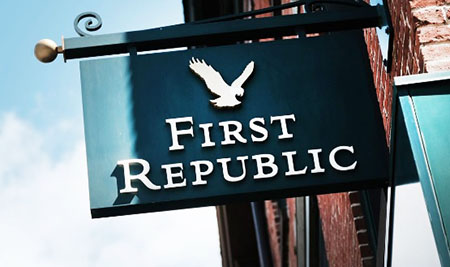by WorldTribune Staff, April 30, 2023
Update: Early Monday morning, May 1, 2023, U.S. regulators seized First Republic and concluded an agreement to sell most of its operations to JPMorgan Chase & Co., the largest bank in the country. It was the second-biggest bank failure in U.S. history, the first being Washington Mutual Inc. in 2008.
JPMorgan Chase, PNC, and Citizens have submitted bids to buy all or part of First Republic Bank, the failing California-based lender that was on the verge of being seized by the government, reports say.
 “People close to the situation say the government is determined to wrap up the sales process for First Republic before the bank opens for business on Monday morning,” the Financial Times reported on Sunday.
“People close to the situation say the government is determined to wrap up the sales process for First Republic before the bank opens for business on Monday morning,” the Financial Times reported on Sunday.
A seizure and sale of First Republic would wipe out the bank’s equity and potentially impose losses on creditors, the Wall Street Journal reported on Friday.
“And so JPM, which is already the largest U.S. bank is about to get even bigger, by scooping up all the good First Republic assets while leaving U.S. taxpayers holding on to the toxic ones,” Zero Hedge noted.
The collapse of First Republic marked the failure of what had been its successful strategy: Targeting wealthy depositors with personal service.
The bank set up a branch inside Facebook’s headquarters and routinely offered wealthy tech clients low long-term mortgages rates.
One such customer was Facebook founder Mark Zuckerberg who in 2012 got a $5.95 million mortgage with a starting rate of 1.05%, according to the Wall Street Journal.
Whether the $30 billion in deposits funneled by JPMorgan and other banks into First Republic will be treated as insured funds or not was not immediately clear, the Wall Street Journal report said.
Those putting in offers for First Republic are dependent on the Federal Deposit Insurance Corporation’s (FDIC’s) insurance fund “covering some of the potential losses that could be created by the transaction, perhaps by taking over all or most of First Republic’s $30bn bond portfolio, which has roughly $500mn in unrealized losses,” the Financial Times reported.
As hopes of a private deal collapsed on Friday, First Republic Bank shares on the New York Stock Exchange (NYSE) were halted for volatility having collapsed 50% to record lows. First Republic shares have lost more than 97 percent of their value this year.
Former Treasury Secretary Lawrence Summers criticized Washington regulators and U.S. banking giants for failing to come up with a solution for the First Republic Bank debacle.
“I’m surprised and disappointed that this situation has continued to linger as long as it has, with the bank’s stock down 95%” and credit gauges deteriorating, Summers said on Bloomberg Television’s “Wall Street Week” with David Westin.
“I hope that between the banks, the FDIC, the other public authorities, that the best way forward will be found within the next week or 10 days,” Summers added. “These are things like forest fires, it is much easier to prevent them than it is to contain them after they start to spread.”
A deal for First Republic would come less than two months after Silicon Valley Bank and Signature Bank failed amid a deposit flight from U.S. lenders, forcing the Federal Reserve to step in with emergency measures to stabilize markets.
Membership . . . . Intelligence . . . . Publish
